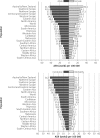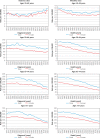Epidemiology of colorectal cancer: incidence, mortality, survival, and risk factors
- PMID: 31616522
- PMCID: PMC6791134
- DOI: 10.5114/pg.2018.81072
Epidemiology of colorectal cancer: incidence, mortality, survival, and risk factors
Abstract
According to GLOBOCAN 2018 data, colorectal cancer (CRC) is the third most deadly and fourth most commonly diagnosed cancer in the world. Nearly 2 million new cases and about 1 million deaths are expected in 2018. CRC incidence has been steadily rising worldwide, especially in developing countries that are adopting the "western" way of life. Obesity, sedentary lifestyle, red meat consumption, alcohol, and tobacco are considered the driving factors behind the growth of CRC. However, recent advances in early detection screenings and treatment options have reduced CRC mortality in developed nations, even in the face of growing incidence. Genetic testing and better family history documentation can enable those with a hereditary predisposition for the neoplasm to take preventive measures. Meanwhile, the general population can reduce their risk by lowering their red meat, alcohol, and tobacco consumption and raising their consumption of fibre, wholesome foods, and certain vitamins and minerals.
Keywords: colorectal cancer; epidemiology; incidence; risk factors.
Copyright: © 2019 Termedia Sp. z o. o.
Conflict of interest statement
The authors declare no conflict of interest.
Figures









Similar articles
-
Risk Factors and Genetic Predisposition in Colorectal Cancer: A Study on Young and Old Adults.Curr Health Sci J. 2021 Jan-Mar;47(1):84-88. doi: 10.12865/CHSJ.47.01.13. Epub 2021 Mar 31. Curr Health Sci J. 2021. PMID: 34211752 Free PMC article.
-
Primary and secondary prevention of colorectal cancer.Clin Med Insights Gastroenterol. 2014 Jul 14;7:33-46. doi: 10.4137/CGast.S14039. eCollection 2014. Clin Med Insights Gastroenterol. 2014. PMID: 25093007 Free PMC article. Review.
-
[Etiopathogenic factors in colorectal cancer. Nutritional and life-style aspects. 2].Nutr Hosp. 2002 May-Jun;17(3):128-38. Nutr Hosp. 2002. PMID: 12149812 Review. Spanish.
-
The Rising Incidence of Younger Patients With Colorectal Cancer: Questions About Screening, Biology, and Treatment.Curr Treat Options Oncol. 2017 Apr;18(4):23. doi: 10.1007/s11864-017-0463-3. Curr Treat Options Oncol. 2017. PMID: 28391421 Review.
-
Global colorectal cancer burden in 2020 and projections to 2040.Transl Oncol. 2021 Oct;14(10):101174. doi: 10.1016/j.tranon.2021.101174. Epub 2021 Jul 6. Transl Oncol. 2021. PMID: 34243011 Free PMC article. Review.
Cited by
-
Applying Deep-Learning Algorithm Interpreting Kidney, Ureter, and Bladder (KUB) X-Rays to Detect Colon Cancer.J Imaging Inform Med. 2024 Oct 31. doi: 10.1007/s10278-024-01309-1. Online ahead of print. J Imaging Inform Med. 2024. PMID: 39482492
-
Antimetastatic effect of nanodiamond-conjugated quercetin against colon cancer: an in vivo study.Turk J Biol. 2024 Sep 17;48(5):279-289. doi: 10.55730/1300-0152.2704. eCollection 2024. Turk J Biol. 2024. PMID: 39474040 Free PMC article.
-
Identification of Metabolic-Associated Genes for the Prediction of Colon and Rectal Adenocarcinoma.Onco Targets Ther. 2021 Mar 31;14:2259-2277. doi: 10.2147/OTT.S297134. eCollection 2021. Onco Targets Ther. 2021. PMID: 33833525 Free PMC article.
-
BRAF Mutated Colorectal Cancer: New Treatment Approaches.Cancers (Basel). 2020 Jun 14;12(6):1571. doi: 10.3390/cancers12061571. Cancers (Basel). 2020. PMID: 32545884 Free PMC article. Review.
-
Efficacy of zinc carnosine in the treatment of colorectal cancer and its potential in combination with immunotherapy in vivo.Aging (Albany NY). 2022 Nov 14;14(21):8688-8699. doi: 10.18632/aging.204380. Epub 2022 Nov 14. Aging (Albany NY). 2022. PMID: 36375474 Free PMC article.
References
-
- Vogelstein B, Fearon ER, Hamilton SR, et al. Genetic alterations during colorectal-tumor development. N Engl J Med. 1988;319:525–32. - PubMed
-
- Peifer M. Developmental biology: colon construction. Nature. 2002;420:274–5. - PubMed
-
- Medema JP, Vermeulen L. Microenvironmental regulation of stem cells in intestinal homeostasis and cancer. Nature. 2011;474:318–26. - PubMed
Publication types
LinkOut - more resources
Full Text Sources
Other Literature Sources
